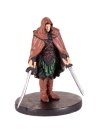Loot!
I went over magic items and cash in the previous post, but there's a dynamic here that is sometimes overlooked (and I must admit, I was overlooking it until just recently). Specifically, there are items (magic and mundane) that most players will want for their characters. Things like rings of regeneration, stat boosting items (gloves of dexterity, etc.), flaming or frost weapons (or whatever), immovable rods (they're just fun), and magic armors or clothing fall into this category. These are items that you can expect the characters to shop for themselves with the cash loot. Other magic items are often very useful, but they don't support the characters' natural abilities in as obvious ways. These items are good for placing as treasure because the characters will want to hold onto them, but wouldn't necessarily think of buying them (particularly if they have limited gold, those magic weapons take priority). I came to this realization while playing a favorite rogue character of mine. I was making a shopping list for our next stop in the capitol city and stopped to think of the magic items I had picked up from treasure piles. I had a couple magic short swords, some kinda ring, +2 shadow leather armor, and a minor circlet of blasting.
Wait, where'd that circlet come from?
Now, I had been spending just about all the money I found in building up my equipment, and I never considered an item quite like the circlet. Don't get me wrong, I love it, especially against undead when my sneak attacks are useless, but even against the living I can cause massive damage by using the circlet AND adding sneak attack damage (it's a ray, I can do that). So now, I'm considering saving up for the major circlet of blasting (maximized damage = good).
The point here is, folks, that you can make traditional loot much more interesting or exciting by throwing in items that players probably wouldn't go out and buy for themselves, but they certainly would not let go of if it got plopped in their lap. Here are a few examples (note: these are not in any particular order and some are much more powerful than others): Items of elemental command (bowl for water, brazier for fire, censer for air, stone for earth), any of Quaal's feather tokens, figurines of wondrous power, sovereign glue (hehehe, universal solvent is not here because if they need it, they'll buy it), horn of fog, Nolzur's marvelous pigments, and Murlynd's spoon. Now, this list is by no means exhaustive, and your players may be a little more open to unusual purchases than most, so just take a look through the DMG and see if you can pick out some that you've never seen in a game before, give them a shot. Also, some items are only really useful in certain situations or when dealing with specific creatures. In this case, be aware of your campaign's environment and how that could effect character purchases and also how your loot could foreshadow the rest of your adventures (this may or may not be a good thing).
Ok, that's all for today. I'm gonna go sneak attack my way to a mithral (mythril/mithril? whatever) chain shirt.
Labels: D and D, d20, Dungeons and Dragons, loot, magic items, rewards











